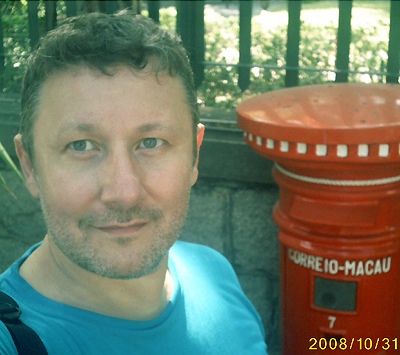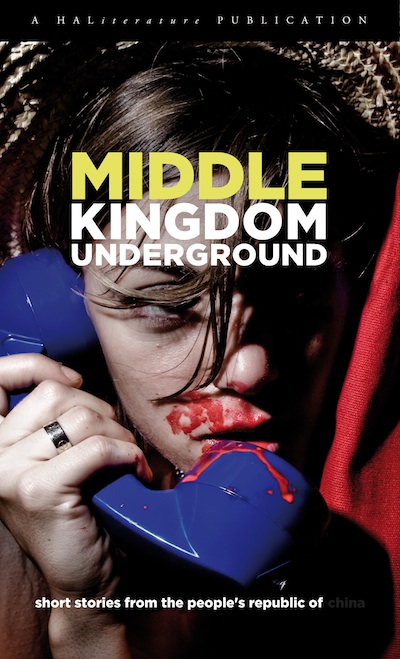Author Spotlight: Miodrag Kojadinovic
H.A.L. is proud to present Miodrag Kojadinovic, one of the many great authors appearing in the follow-up short story collection to Party like it’s 1984. With HAL’s first collection you were given a look at life behind the bamboo curtain. Now, HAL wants to show you a different side of life in the People’s Republic of – namely, what goes on beneath the sheets and behind locked doors. All the naughty bits. This November will mark the release of the new book, along with another amazing launch party that will rival last year’s glamorous bash at River South. So get ready for dirty hook-ups in the Shanghai Metro, funny money, grifters, sex with big plastic bags, and, in Miodrag’s case, questionable activities involving bunny rabbits! While you won’t get to see the actual stories from the book until the release, we can give you a little taste of the talent.
Without further adieu, here is a sample of the excellence you will see in the new book!
Miodrag Kojadinović is a Canadian-Serbian dual national, poet, prose writer, journalist, translator, interpreter, and photographer. His 200+ pieces of writing have been published in English, Serbian, Dutch, Russian, Hungarian, and Slovene in Canada, Serbia, the US, France, Russia, China, England, Holland, Slovenia, India, Croatia, and Montenegro and he has appeared in three documentaries shown at festivals (of which one was specifically about Kojadinović).
Now the beautiful boys…
© Miodrag Kojadinovic
Now the beautiful boys are no longer.
A man in a plastic orange cloak has piled
empty soft drink cans
on a black sheet. Sand whirls,
carried on the wind’s wings.
The gray of the sea dissipates in the mist,
a ketchup-stain-like sun is low on the horizon.
Gulls cry somewhere in the milky skies.
Where have you gone to, knights of gymnasiums?
Your sweat smelled of tanning lotions and algæ,
your bronzed lithe bodies sprinkled
with tinsel jewel droplets.
It was nice to feel the wet fleece
while I petted your heads.
Two reed umbrellas need repairing,
holes gape inquisitively up.
The country I was born in is being torn apart,
civil war has swallowed
its first swallows
of a promised spring of freedom.
The deserted beach is so indifferent,
so forlorn,
so safe.
Bygone is the tornado bunch of carnival in-hoppers;
the tired host takes his shot of scotch
before starting to wipe the mess up.
Up you fly,
silken kite of persistence,
crutch of ersatz-hope.
Here comes Lady Godiva on a mule.
– Which part is nude bathing? – asks she.
Crests of the waves arrive from afar
to scatter on the Checkpoint Neptune.
La playa esta abandonada.
The beautiful boys are no longer.
Lowlanders & Highlanders
© 1994 Miodrag Kojadinović
Lowlanders, i.e. People Who Climb on Pumpkins
People who dwell in plains diphthongise vowels,
particularly o. Their vocal scale is more on the side
of a quadrature of the circle, a dual option:
e floats between an emphatic i and an apathetic a.
They are tolerant, often bilingual. For transportation
they use bikes, troikas and (sometimes) yawls.
As a rule their population growth is not high.
They are individualists, but have a social conscience.
There is a suicidal tendency.
Until they kill themselves, they engage in trade:
diamonds, silk, hogs, antiques. Strangely, they
indulge in booze more often than the highlanders.
When drunk, they sing: in a choir, or seldom solo.
They go to their temple regularly, but are sceptical
and pragmatic. Haunted castles, lake nymphs and
multi-headed dragons are ridiculous and distant
to them. Only the ghost of a drowned man disturbs
them occasionally.
The taboo of incest is stronger here than on the hills;
— since they do not resolve it, they are burdened for life.
Not until the sixth generation do they degenerate.
Their inner preference is for warm colours, but they are
ashamed to admit that. They live in houses on the walls
of which the water level is easy to read. When necessary,
they stick their fingers in dikes. Grow grains, tulips
and vegetables, motley cows and silkworms. Build
windmills. In winter they skate on frozen canals,
possibly rivers and bays.
To them a sinusoid is no horizon line, but a graphic
symbol of some cycle, business trend, for instance. They
strongly try to preserve their kitsch culture of happiness
against those who descend to their midst in gusts. In vain.
Highlanders, i.e. People Who Jump off Cliffs
Highlanders move their accent up to two syllables forwards
or backwards. Blood feud and umlaut are carried out
very consistently. They often get lost in a forest, where
they find buried gold, mushrooms, strange berries and
precious stones. They encounter dwarves and trolls.
Visit witches who live in gingerbread houses or huts
on chicken legs.
They respect blacksmiths, their mothers and tribal elders.
Kill their wives by hitting them on the skull with hammers,
over a bread loaf. Sometimes they are werewolves,
but mainly wear fur for protection from the cold.
In summer, they like black and white combinations,
although the unrestrainedness of Gaultier’s fashion is
likely to be a tad too eccentric for them, usually.
They seldom bathe, know where proto-demons dwell
and maintain close ties with those. People in the plains
they despise and envy.
They have a free, infantile mind, bordering the collective
unconscious. From barley, they make whisky, not beer.
They are eager to get killed “for issues of honour”.
Since they fear the horizontal, they die more often
from circulatory diseases than from cancer — causing
a straight line to hum monotonously on the green
monitor. Then the sons take over the corpses, travel
a long way uphill, towards the skies and bury them
amidst the rocks.
“Heureux qui comme Ulysse…”
First published in “The Split Mind”, Split, Vol. VII/9, 2010
For more amazing poetry by Miodrag, check out Locutio.



